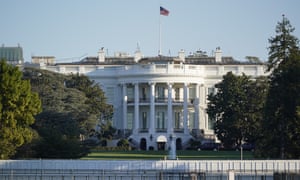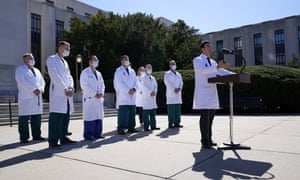Skenario
Soal Pemilu dan Pemerintahan AS,
Jika COVID-19 Donald Trump
Berlarut
Liputan6.com, Jakarta - Beberapa minggu menjelang pemilihan umum AS pada 3 November mendatang, Donald Trump dinyatakan positif terkena Virus Corona COVID-19.
Hal ini pun menimbulkan sejumlah pertanyaan tentang apa yang mungkin terjadi selanjutnya. Berikut sejumlah skenario, seperti dikutip dari BBC (4/10/2020).
BACA JUGA
1. Acara kampanye yang bisa dilewatkan Trump
Trump diharuskan mengisolasi diri selama 10 hari sejak menerima dinyatakan positif COVID-19 pada 1 Oktober, jadi ia mungkin masih dapat mengambil bagian dalam debat presiden berikutnya, yang dijadwalkan pada 15 Oktober.
Reli yang akan berlangsung di Florida pada Jumat 2 Oktober 2020 dibatalkan. Begitu pula panggilan konferensi video dengan lansia yang rentan.
Trump memiliki jadwal kampanye lain yang dijadwalkan selama periode ini, yang sekarang harus dibatalkan atau ditunda.
2. Keadaan yang bisa membuat pemilu ditunda
Masa isolasi diri Presiden Trump jelas berdampak pada kemampuannya untuk berkampanye.
Jadi pertanyaan telah muncul, apakah pemilu bisa ditunda, dan bagaimana ini bisa terjadi.
Pemilihan presiden AS diadakan berdasarkan undang-undang pada hari Selasa setelah Senin pertama bulan November, setiap empat tahun - jadi tahun ini diadakan pada tanggal 3 November.
Mengubah tanggal tersebut bergantung dari keputusan anggota parlemen AS dan bukan dari presiden.
Keputusan ini akan membutuhkan mayoritas dari mereka di kedua Gedung Kongres untuk memberikan suara yang mendukung setiap perubahan tanggal. Hal ini dinilai tidak mungkin, mengingatnya bahwa harus melewati Dewan Perwakilan Rakyat yang dikendalikan Demokrat.
Kalaupun diubah, konstitusi AS mengatur bahwa pemerintahan presidensial hanya berlangsung selama empat tahun. Jadi, masa jabatan Presiden Trump otomatis akan berakhir pada siang hari, 20 Januari 2021.
Mengubah tanggal ini akan membutuhkan amandemen konstitusi. Ini harus disetujui oleh dua pertiga anggota parlemen AS atau badan legislatif tingkat negara bagian, kemudian tiga perempat negara bagian AS - yang, sekali lagi, tidak mungkin.
3. Seandainya Trump Sakit
dalam Jangka Waktu Panjang
Jika presiden masih menderita sakit hingga tak lagi mampu menjalankan tugasnya, inilah yang ditetapkan oleh konstitusi AS:
Amandemen ke-25 memungkinkan presiden menyerahkan kekuasaan kepada wakil presiden, yang berarti Mike Pence akan menjadi penjabat presiden. Setelah fit kembali, Trump bisa merebut kembali posisinya.
Jika presiden terlalu tidak sehat untuk menyerahkan kekuasaannya, kabinet dan wakil presiden dapat menyatakan dia tidak dapat melanjutkan, dan Pence akan mengambil peran tersebut.
Jika Pence juga tidak mampu, di bawah Undang-Undang Suksesi Presiden Nancy Pelosi, ketua DPR - seorang Demokrat - akan menjadi kandidat yang berikutnya, meskipun para ahli konstitusi mengatakan pengalihan kekuasaan semacam itu akan memicu pertempuran hukum.
Jika dia tidak mau atau tidak dapat mengambil peran itu, jabatan akan diserahkan kepada Senator Republik senior saat ini Charles E Grassley yang berusia 87 tahun. Hal ini juga hampir pasti akan menghadapi tantangan hukum.
Hal semacam ini pernah terjadi juga dalam sejarah presidensial AS.
Pada tahun 1985, ketika Presiden Ronald Reagan berada di rumah sakit untuk operasi kanker, dia menempatkan wakil presidennya, George HW Bush, sebagai penanggung jawab.
Pada tahun 2002 dan 2007, Presiden George W Bush melakukan hal yang sama dengan wakil presidennya ketika dia dibius selama kolonoskopi rutin.
4. Nasib Trump di Pemilu AS 2020:strip_icc():format(jpeg)/kly-media-production/medias/3253373/original/009935700_1601439181-20200930-Debat-Capres-AS-8.jpg)
Jika, karena alasan apa pun, seorang calon yang dipilih oleh sebuah partai sebagai calon presiden tidak mampu menjalankan peran itu, ada prosedur yang jelas yang akan dijalankan.
Meskipun Wakil Presiden Mike Pence pada awalnya akan menjalankan tugas kepresidenan, dia belum tentu menjadi kandidat pemilihan partai Republik - karena mereka telah secara resmi mencalonkan Trump.
Di bawah aturan partai, 168 anggota Komite Nasional Republik (RNC) akan memberikan suara untuk memilih calon presiden baru, dengan Mike Pence menjadi sebagai salah satu kandidat yang paling mungkin.
Jika Pence terpilih, calon wakil presiden baru harus dipilih.
Baik Demokrat maupun Republik tidak pernah menggantikan calon presiden mereka setelah secara resmi memilihnya.
Sedangkan terkait suara yang sudah terkumpul, ni akan menimbulkan banyak ketidakpastian, kata para ahli, karena jutaan suara pos telah dikirim dengan nama-nama kandidat yang dicalonkan oleh partainya.
Pemungutan suara secara langsung awal juga telah dimulai di beberapa negara bagian.
Pemungutan suara mungkin akan dilanjutkan dengan nama kandidat yang tidak mampu masih ada dalam surat suara, tulis Rick Hasen, seorang profesor hukum di University of California, Irvine.
Namun akan ada pertanyaan tentang apakah undang-undang negara bagian mengizinkan orang yang dicalonkan untuk memberikan suara di perguruan tinggi pemilihan AS - disebut pemilih presiden - untuk memilih calon pengganti.
"Presiden Trump hampir pasti akan tetap dalam pemungutan suara, apa pun yang terjadi," tulis Richard Pildes , seorang profesor hukum dengan keahlian dalam pemilihan.
Dia menunjukkan dalam teori, Partai Republik dapat meminta perintah pengadilan untuk mengubah nama kandidat, tetapi dalam praktiknya tidak akan ada cukup waktu.
Panic and confusion permeate White House after Trump's Covid diagnosis
https://www.theguardian.com/us-news/2020/oct/04/trump-covid-white-house-panic-confusion
Concerns mount over spread of the virus within the building, and whether it could disrupt the functioning of government
Golden autumn sunshine shone down on Washington on Saturday to illuminate a US capital upended as Donald Trump began his first full day in hospital battling coronavirus amid a presidential election thrown into chaos.
Just hours earlier, on Friday evening after an excruciating wait for news, the president had emerged from the White House with a lacklustre wave and thumbs up, but ignoring reporters’ shouted questions about the state of his health.
Trump stalked slowly across the south lawn and boarded the US presidential helicopter. The only visual clue that something profound had changed was Trump’s face: he was wearing a mask.
As Marine One lifted into the sky just before sunset, the president left behind a White House staff suddenly rudderless, fearful and unsure how the story will end. The reality TV star turned president has delivered his greatest moment of suspense and the presidential election with its first “October surprise” but maybe not its last.
Trump, 74, is spending the weekend at a military hospital near Washington after discovering that not even the commander in chief of the world’s most powerful country is immune to the coronavirus. Said to be feverish and fatigued, there is huge uncertainty over his condition, its potential to deteriorate and whether he might become incapacitated.
In his absence, the mood in the White House was said to be one of panic, with growing concern over the extent of the spread of the virus within the building and whether it could disrupt the functioning of government.
Staff have taken their lead from Trump’s bubble of denial for months, eschewing face masks and congregating in the west wing’s cramped spaces and narrow hallways. The president’s positive test was chilling proof of what the rest of the country has long known: no one is safe.
“People are losing their minds,” one source told the Washington Post newspaper.
As Friday wore on and Trump’s condition worsened, staff were also forced to confront the possibility that his health could be at serious risk. An information vacuum filled with rumour and speculation and did little to calm nerves, with media outlets forced to depend on leaks from anonymous officials or presidential tweets such as: “Going welI, I think! Thank you to all. LOVE!!!”
The heavily guarded White House is one of the world’s most secure properties with a new 13ft tall fence to keep out intruders, protesters and terrorists. Yet it too was breached by the invisible pathogen that has killed more than 205,000 Americans. Commentators said there could be no greater proof of the administration’s failure to combat the pandemic.
How, when or from whom Trump became infected remains a mystery. But the myth of invulnerability may have been finally shattered by an event in the White House Rose Garden last Saturday in which he nominated judge Amy Coney Barrett to the supreme court. More than 150 guests sat close together without face masks, apparently lulled into thinking it was safe to do so in the open air.
But at least seven attendees – Trump, the first lady Melania Trump, former White House counselor Kellyanne Conway, ex-New Jersey governor Chris Christie, Senators Mike Lee and Thom Tillis and the University of Notre Dame president, John Jenkins – have all since tested positive for the virus.
On Saturday morning it emerged that the Trump re-election campaign manager, Bill Stepien, had also tested positive, fueling more chaos into the election. Deputy campaign manager Justin Clark is set to run the Trump campaign headquarters in Stepien’s absence.
After last Saturday’s Rose Garden celebration, an event which continued with receptions indoors at the White House, Trump spent a whirlwind week campaigning for the 3 November presidential election.
On Tuesday there was a chaotic and dismal debate with rival Joe Biden in Cleveland, Ohio, where many of his entourage sat unmasked in contrast to the Democrat’s team, who strictly followed the protocols.
On Thursday, Trump attended a political fundraiser at his golf club in Bedminister, New Jersey, even though he was aware he had been exposed to the infected Hicks. That night, sounding unconcerned, he gave an interview to Sean Hannity of Fox News, apparently blaming the military or law enforcement for violating physical distancing: “They want to hug you and kiss you because we really have done a good job for them. You get close, and things happen.”
Trump’s revelation that he was positive came in perhaps the most momentous tweet of his entire presidency just before 1am on Friday. At last, critics said, a man notorious for dealing in disinformation and fantasies had to face a cold scientific truth he could not wish, insult or tweet away.
He also referred to it in the tweet correctly as Covid-19, having previously referred to the disease in public remarks variously as “the China virus”, the plague and “kung flu”.
Later that morning, the White House tried to project an air of business-as-usual. Officials Mark Meadows, Larry Kudlow and Kayleigh McEnany all sought to assure reporters that Trump was in good spirits and had only mild symptoms.
Yet by the afternoon, there was evidence of growing gap between spin and reality. It was announced that Trump had been injected with an experimental drug combination and, “out of an abundance of caution”, would be flown to hospital. The otherwise routine Marine One journey gave many in Washington a sense of witnessing history unfold before their eyes.
Howard Fineman, a journalist, tweeted: “I’ve seen and heard many indelible moments here in DC over the years, but nothing like Marine One flying over our neighborhood bound for Walter Reed, bearing a president struck, like millions of others, by global pandemic. Unsettling, scary. Politics is stilled for just a moment.”
Officials said Trump’s stay of a few days at Walter Reed national military medical center is precautionary and that he will continue to work from the hospital’s presidential suite, which is equipped to allow him to keep up his official duties.
But a series of conflicting and contradictory messages sowed doubts in the public mind. A press conference by the medical team on Saturday painted a rosy picture but dodged key questions about whether Trump had received supplementary oxygen and gave a confusing timeline that later had to be corrected.
The president released a video on Saturday night, looking worn but insisting: “I feel much better.” Later his chief of staff, Mark Meadows, told Fox News: “He’s made unbelievable improvements from yesterday morning, when I know a number of us, the doctor and I, were very concerned … He had a fever and a blood oxygen level that dropped rapidly.”
Yet on the morning he referred to, Meadows had told reporters that Trump had “mild symptoms” and was “very energetic”.
His hospitalisation represents the gravest threat to an incumbent US president’s health since 1981 when Ronald Reagan survived a would-be assassin’s bullet outside a Washington hotel and received emergency medical attention.
Trump’s age, sex, obesity and elevated cholesterol put him at greater risk of becoming seriously ill from a virus that has infected more than 7 million people nationwide. If he declines sharply and is unable to carry out his responsibilities, he could transfer power to the vice-president, Mike Pence, under the 25th amendment to the constitution. Pence tested negative for the virus on Friday.
Bill Whalen, a research fellow at the Hoover Institution thinktank at Stanford University in Palo Alto, California, said: “The dominoes are multiple. There’s the question of his ability to campaign in person moving ahead. There’s the question of his ability to have the office right now: the 25th amendment. I’ve talked to some of my conservative friends who think he should be invoking this right now.
“I hate to speculate like this, but what if his health did deteriorate rather fast to the point where either he was unconscious or just delirious? Then the vice-president, the cabinet, would have to step in and do this, so there’s actually a school of thought that he should invoke it proactively.”
The US government has a long history of opacity when it comes to presidents’ health and the Trump White House, in particular, suffers from a trust deficit.
Kurt Bardella, a senior adviser to the anti-Trump group the Lincoln Project, said: “What we’re seeing is a very healthy scepticism about anything that comes from the White House. These are the same people who have been lying about everybody else’s health terms of the impact of Covid-19, so why would we expect any differently when they’re talking about themselves?”
Dan Rather, a veteran journalist who reported on Richard Nixon’s downfall in 1974, added on Twitter: “What we don’t know is a lot more than what we do know. And we have an administration that long ago squandered its credibility. All coverage of this crisis should keep these truths in mind for context.”
His next debate with Biden, scheduled for 15 October, is in doubt. As well as Stepien testing positive for Covid-19, so has key ally Ronna McDaniel, the head of the Republican National Committee, and former New Jersey governor Chris Christie, who helped coach Trump for the first debate with Biden. Despite Trump’s attempts to change the conversation, for example with Barrett’s court nomination, the pandemic remains the defining issue at the ballot box.
Glen Bolger, a Republican pollster, told the Associated Press: “It’s challenging. It would be better if the discussion was about jobs and the economy, or even Joe Biden is going to ‘be held captive to the left’. But the election is going to be about coronavirus, and that’s not favourable terrain for Republicans.”
The US election ...
… has suddenly become more unpredictable. America faces an epic choice in November, and the result will have global repercussions for democracy, progress and solidarity for generations. Transatlantic ties, superpower relations and the climate emergency are all in the balance. Abortion, healthcare access, gender equality, and racial justice in the US are at risk – issues that disproportionately impact the lives of women, minorities and those on lower income.
In these chaotic, perilous times, an independent, truth-seeking news organisation like the Guardian is essential. With dozens of journalists in the US, we are dedicated to bringing readers like you a clear, international perspective on the world’s foremost power.
Millions are flocking to the Guardian for open, independent, quality news every day, and readers in 180 countries around the world now support us financially. Thank you from joining us today from Indonesia.
We believe everyone deserves access to trustworthy information. That’s why we choose to keep our reporting open for all readers, regardless of where they live or what they can afford to pay.
The Guardian has no shareholders or billionaire owner, meaning our journalism is free from bias and vested interests – this makes us different. Our editorial independence and autonomy allows us to provide fearless investigations and analysis of those with political and commercial power. We can give a voice to the oppressed and neglected, and help bring about a brighter, fairer future. Your support protects this.
With just weeks to go until the presidential election, our eyes are on Washington. If there were ever a time to join us, it is now. You have the power to support us through these volatile economic times and enable our journalism to reach more people, in all countries.
Every contribution, however big or small, makes a difference. Support the Guardian from as little as $1 – and it only takes a min
:strip_icc():format(jpeg)/kly-media-production/avatars/1904348/original/090755000_1569940180-pict20190615_193539_0.JPG)
:strip_icc():format(jpeg)/kly-media-production/medias/2978775/original/094862800_1574825095-20191126-Presiden-Trump-Ampuni-Kalkun-di-Hari-Thanksgiving-AP-2.jpg)
:strip_icc():format(jpeg)/kly-media-production/medias/1291004/original/083267400_1468821576-trumppence..jpg)


